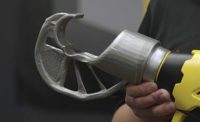Software Harmonizes Instrument Design Process

Korg Italy produces only high-end digital pianos and electronic arranger keyboards. Photo courtesy Korg Italy SpA
Most challenges manufacturers face involve the assembly process of one or more of their products. Sometimes, though, a company struggles with where to locate its headquarters or build another plant for market expansion.
Musical-instrument maker Korg Inc. faced the latter situation in the mid-1990s. Founded and based in Tokyo since 1962, Korg considered building another plant in many European cities before picking Osimo, Italy, in 1995. The company opened a facility there because of the area’s tradition of manufacturing electronic music instruments, such as the famous console organ (a forerunner of today’s digital keyboards).
Jürgen Schmitz, co-founder and R&D manager of Korg Italy SpA, says the Osimo plant is dedicated to
producing only high-end digital pianos and electronic arranger keyboards. He also notes that it operates independently under the Korg brand name.
“[The plant] has its own dedicated R&D department that handles not just the electronic and musical part, but all other aspects of product design,” explains Schmitz. “These include the mechanics, hardware, industrial design and everything else that goes into a new product.”
All of Korg Italy’s pianos and keyboards feature one or more internal circuits and mechanisms that usually require alterations during the design process. When these changes occur at an advanced stage in the product development cycle, Korg Italy incurs considerable costs.
“We often have to repeatedly modify an initial design to accommodate changes to internal components, such as a printed circuit board that is larger than anticipated,” explains Paolo Capeci, head of design at Korg Italy. “When this happens, we cannot afford to
dismantle the entire original design.”
Since 2013, the company has relied on Evolve design software to more-easily perform, and cost-effectively manage, all instrument-design modifications. The results, according to Capeci, have been improved product quality, increased instrument production and simplified creation of instrument cases and packaging.
Made by solidThinking, Evolve lets designers work in real time and make changes on the fly without any rework. The software runs on Mac OS X and Windows, and has a ConstructionTree history feature that exports digital models so multiple design team members can view them on demand.
Users are able to capture an initial sketch, explore styling alternatives and directly create photorealistic 3D images inside the modeling window without third-party tools. Models are based on nonuniform rational basis spline (NURBS) surfaces, which map two parameters in a three-dimensional space.
“With Evolve, we maintain full control over the project through all its stages, from concept development to construction of the mold,” says Capeci. “And for those of us who make objects containing mechanisms, the ConstructionTree feature is invaluable.”
Equally important, the software has altered Korg Italy’s business model so it no longer considers itself to be just a manufacturer of digital instruments. Now, says Capeci, the company creates objects that fit stylishly into a living space.
“Simple musical instruments have become design objects that are pleasing and stimulating even to nonmusicians,” concludes Capeci. “Today, we [are able to] exhibit our products at the Salone del Mobile [museum] in Milan.”
For more information on design software, call 248-526-1920 or visit www.solidthinking.com.
Looking for a reprint of this article?
From high-res PDFs to custom plaques, order your copy today!






